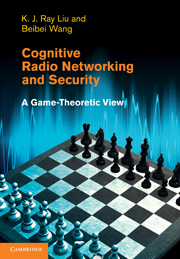Book contents
- Frontmatter
- Contents
- Preface
- Part I Cognitive radio communications and cooperation
- Part II Resource awareness and learning
- Part III Securing mechanism and strategies
- 15 Trust modeling and evaluation
- 16 Defense against routing disruptions
- 17 Defense against traffic-injection attacks
- 18 Stimulation of attack-resistant cooperation
- 19 Optimal strategies for stimulation of cooperation
- 20 Belief evaluation for cooperation enforcement
- 21 Defense against insider attacks
- 22 Secure cooperation stimulation under noise and imperfect monitoring
- References
- Index
20 - Belief evaluation for cooperation enforcement
from Part III - Securing mechanism and strategies
Published online by Cambridge University Press: 06 December 2010
- Frontmatter
- Contents
- Preface
- Part I Cognitive radio communications and cooperation
- Part II Resource awareness and learning
- Part III Securing mechanism and strategies
- 15 Trust modeling and evaluation
- 16 Defense against routing disruptions
- 17 Defense against traffic-injection attacks
- 18 Stimulation of attack-resistant cooperation
- 19 Optimal strategies for stimulation of cooperation
- 20 Belief evaluation for cooperation enforcement
- 21 Defense against insider attacks
- 22 Secure cooperation stimulation under noise and imperfect monitoring
- References
- Index
Summary
In autonomous mobile ad hoc networks (MANETs) where each user is its own authority, the issue of cooperation enforcement must be solved first in order to enable networking functionalities such as packet forwarding, which becomes very difficult under noise and imperfect monitoring. In this chapter, we consider cooperation enforcement in autonomous MANETs under noise and imperfect observation and study basic packet forwarding among users using repeated-game models with imperfect information. A belief-evaluation framework is presented to obtain cooperation-enforcement packet-forwarding strategies that are based solely on each node's private information, including its own past actions and imperfect observation of other nodes' information. More importantly, we not only show that the strategy with a belief system can maintain the cooperation paradigm but also establish its performance bounds. The simulation results illustrate that the belief-evaluation framework can enforce cooperation with only a small performance degradation compared with the unconditionally cooperative outcomes when noise and imperfect observation exist.
Introduction
One major drawback of the existing game-theoretic analyses on cooperation in autonomous ad hoc networks is that all of them have assumed perfect observation, and most of them have not considered the effect of noise on the strategy design. However, in autonomous ad hoc networks, even when a node has decided to forward a packet for another node, this packet may still be dropped due to link breakage or transmission errors.
- Type
- Chapter
- Information
- Cognitive Radio Networking and SecurityA Game-Theoretic View, pp. 496 - 518Publisher: Cambridge University PressPrint publication year: 2010



